Alphabet Bundle
How did a simple search engine become a tech empire?
From a humble start in a California garage to dominating the global tech landscape, the Alphabet SWOT Analysis reveals a fascinating story. The Alphabet Company, formerly known as Google, has reshaped how we access and interact with information. This journey, marked by relentless innovation, has transformed the internet and our lives.
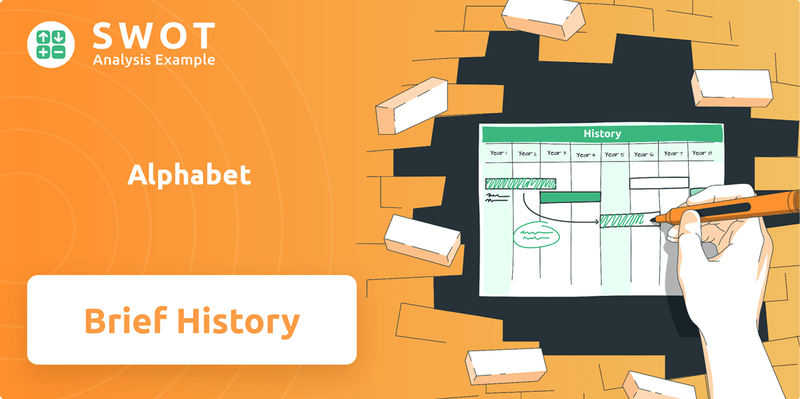
The Google History is a story of ambition and foresight, driven by founders Larry Page and Sergey Brin. The Alphabet Inc., the Google Parent Company, was created to manage a diverse portfolio of ventures, showcasing a strategic evolution from its initial search engine roots. Understanding the Tech Company History of Alphabet provides valuable insights into its current market position and future potential.
What is the Alphabet Founding Story?
The Competitors Landscape of Alphabet, formerly Google, has a fascinating origin story. Alphabet Inc. officially came into existence on October 2, 2015, following a significant restructuring of Google Inc. This transformation marked a pivotal moment in the evolution of the tech giant.
The genesis of the Alphabet Company lies in the vision of Larry Page and Sergey Brin, who co-founded the original Google in 1998. Their collaboration began in 1995 when they were both Ph.D. students in computer science at Stanford University. They identified the challenge of organizing the rapidly expanding World Wide Web, leading them to develop a new search engine technology.
This search engine, initially called 'Backrub,' ranked web pages based on their relevance and importance, using backlinks as a key metric. The company's initial business model centered on providing a superior search experience. The name 'Google' itself stemmed from a misspelling of 'Googol,' a mathematical term representing 1 followed by 100 zeros. Early funding came from angel investors, including Andreas von Bechtolsheim, Kavitark Ram Shriram, David R. Cheriton, and Jeff Bezos in 1998. These investments enabled the move to a garage in Menlo Park, California.
The restructuring into Alphabet in 2015 allowed for greater management scale and operational independence.
- 1995: Larry Page and Sergey Brin meet at Stanford University.
- 1998: Google is founded, with initial funding from angel investors.
- 2015: Google Inc. restructures to become Alphabet Inc.
- 2024: Alphabet continues to innovate across various sectors, including search, AI, and autonomous vehicles.
Alphabet SWOT Analysis
- Complete SWOT Breakdown
- Fully Customizable
- Editable in Excel & Word
- Professional Formatting
- Investor-Ready Format
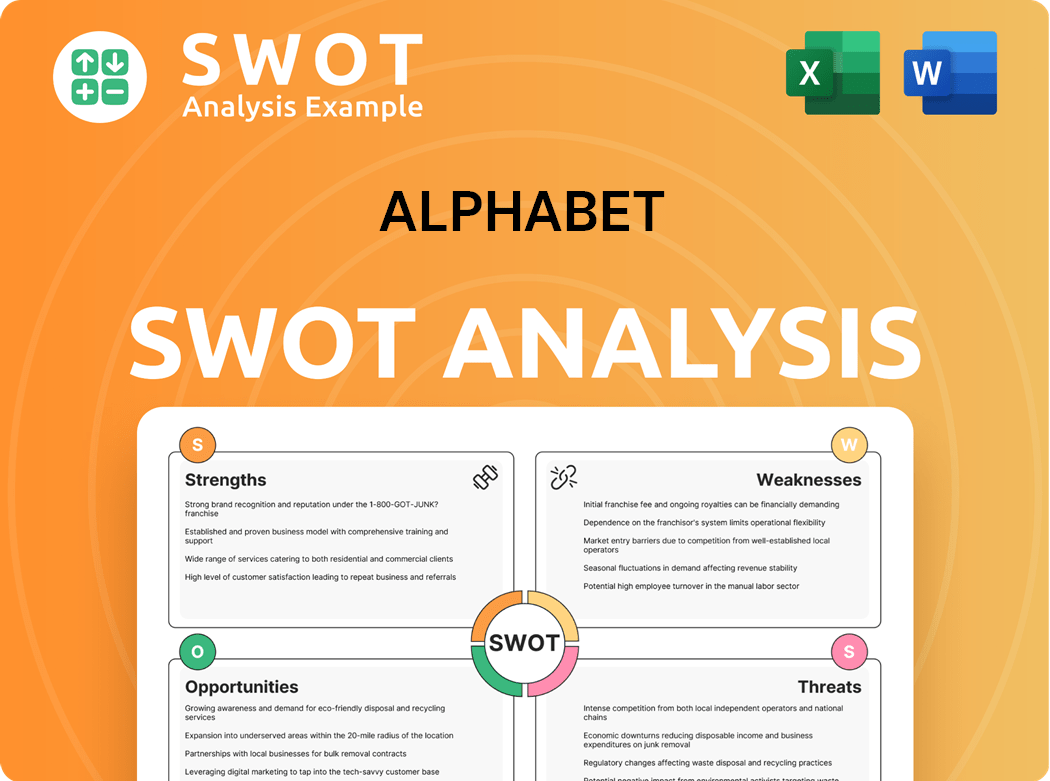
What Drove the Early Growth of Alphabet?
The early growth and expansion of the Alphabet Company, formerly known as Google, showcases a remarkable journey of innovation and strategic diversification. From its inception in 1998, the company rapidly evolved beyond its core search engine, introducing groundbreaking products and services. This period was marked by significant acquisitions and a strategic shift towards a holding company structure, solidifying its position as a tech industry leader.
In 1998, the Alphabet Company, then Google, introduced the Google Doodle, marking an early sign of its innovative spirit. By 1999, the company had grown to 50 employees and relocated to its Mountain View, California headquarters, the iconic Googleplex. Early product launches, like Google Books in 2004, Google Maps in 2005, and the Android mobile platform in 2007, expanded its reach.
The company's expansion strategy included key acquisitions to broaden its offerings. The 2006 acquisition of YouTube and the 2008 acquisition of DoubleClick significantly boosted its advertising capabilities. Waze was acquired in 2013, and Nest in early 2014, demonstrating its efforts to diversify into new product categories. These moves were pivotal in shaping the Marketing Strategy of Alphabet.
The transition to Alphabet Inc. in 2015 was a pivotal move, establishing a holding company structure to manage Google and its "Other Bets" as independent subsidiaries. This strategic shift aimed to empower individual companies with greater autonomy and focus. By 2014, Google was the largest employer in Mountain View, with over 11,000 employees.
Alphabet's growth has been substantial, with consolidated revenues increasing by 12% year-over-year to $90.2 billion in Q1 2025. Google Services, including Search and YouTube ads, saw a 10% increase to $77.3 billion. Google Cloud revenues surged by 28% to $12.3 billion, reflecting strong market reception, particularly in cloud services and AI-powered offerings.
Alphabet PESTLE Analysis
- Covers All 6 PESTLE Categories
- No Research Needed – Save Hours of Work
- Built by Experts, Trusted by Consultants
- Instant Download, Ready to Use
- 100% Editable, Fully Customizable
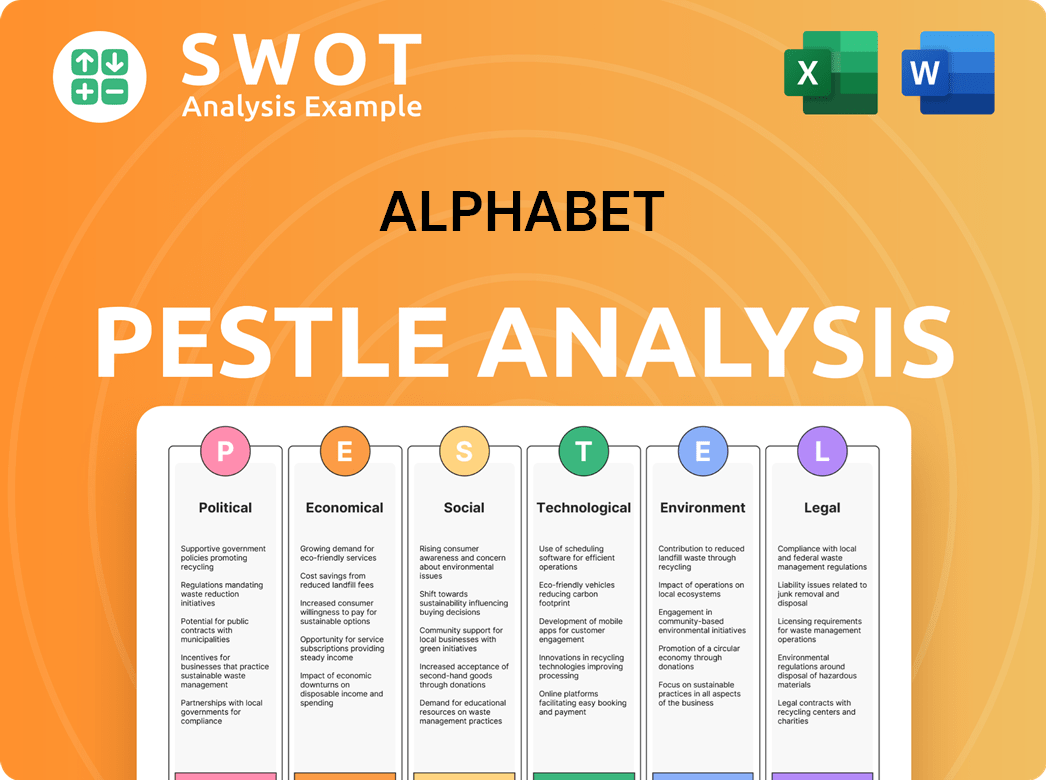
What are the key Milestones in Alphabet history?
The Alphabet Company, formerly known as Google, has achieved numerous milestones since its inception, significantly impacting the tech industry. From its origins as a search engine to its expansion into diverse sectors, the company's journey reflects a history of innovation and strategic evolution. This evolution highlights the Google History and its transformation into the Google Parent Company.
| Year | Milestone |
|---|---|
| 1998 | Larry Page and Sergey Brin founded Google, initially focusing on search engine technology. |
| 2004 | Google went public, marking a significant step in its growth and expansion. |
| 2008 | The Android operating system was publicly released, becoming a major player in the mobile market. |
| 2015 | Google restructured under a new parent company, Alphabet Inc., to diversify its ventures. |
| 2024 | AI Overviews in Search now serve 1.5 billion users per month, demonstrating significant user engagement. |
| Q1 2025 | Google Cloud's operating income surged by 141.9% year-on-year to $2.2 billion, with its operating margin expanding to 17.8%. |
Alphabet Inc. has consistently pushed the boundaries of technology through various innovations. The development of the Android operating system and advancements in artificial intelligence, including the recent rollout of Gemini 2.5, showcase the company's commitment to innovation.
The Android operating system, released in 2008, revolutionized the mobile industry, becoming one of the most widely used platforms globally. Its open-source nature and adaptability have fueled its widespread adoption and continuous development.
Alphabet Company has made significant strides in AI, particularly in voice recognition, image processing, and self-driving vehicles (Waymo). The recent advancements with Gemini 2.5 highlight its ongoing commitment to AI innovation.
Continuous improvements to Google Search, including AI Overviews, enhance user experience and information access. These features are designed to provide more relevant and comprehensive search results.
Google Cloud has expanded its services to provide infrastructure and AI solutions for businesses. This expansion is reflected in the strong growth in operating income and margin.
Waymo, Alphabet's self-driving car project, is at the forefront of autonomous vehicle technology. It is continuously testing and refining its technology to improve safety and reliability.
Gemini 2.5, the most intelligent AI model, is achieving breakthroughs in performance. This model is widely recognized in the industry.
Despite its successes, Alphabet Inc. faces several challenges. Regulatory scrutiny and antitrust lawsuits, particularly concerning its online advertising business, pose significant hurdles.
Ongoing investigations and lawsuits related to its advertising practices and market dominance create uncertainty. A U.S. District Court ruling in August 2024 found Google illegally maintained monopolies in online advertising.
Intense competition from companies like OpenAI and Microsoft in the AI sector could impact its core search business. These competitors are rapidly advancing their AI technologies.
Alphabet's total greenhouse gas emissions increased by 13% in 2023 from 2022, primarily due to higher energy use at data centers and supply chain emissions. The company faces environmental sustainability challenges.
While AI investments drive growth, they also lead to increased capital expenditures and depreciation costs. These costs could potentially impact profitability margins.
Changes in the digital advertising market and evolving consumer behavior require continuous adaptation. Alphabet must stay agile to maintain its market position.
The company needs to make strategic investments in AI and focus on operational efficiencies. Alphabet aims to overcome these challenges through strategic investments in AI, continued innovation, and a focus on operational efficiencies.
Alphabet Business Model Canvas
- Complete 9-Block Business Model Canvas
- Effortlessly Communicate Your Business Strategy
- Investor-Ready BMC Format
- 100% Editable and Customizable
- Clear and Structured Layout
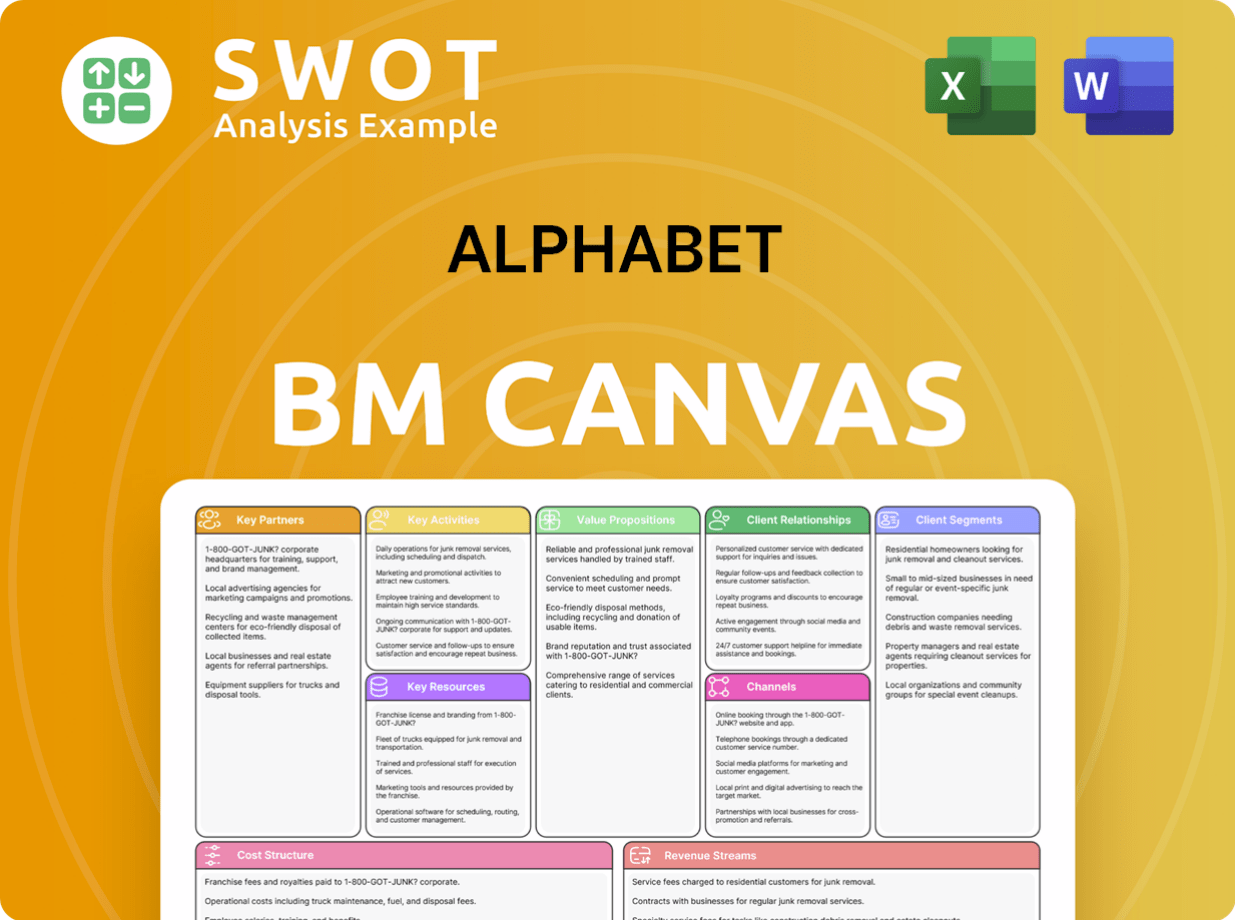
What is the Timeline of Key Events for Alphabet?
The Mission, Vision & Core Values of Alphabet, formerly known as Google, has a rich history marked by innovation and strategic expansion. Founded in 1998 by Larry Page and Sergey Brin, the company quickly grew from a search engine to a tech giant. The evolution of Alphabet Inc. reflects its ambition to explore diverse technological frontiers, from online advertising and cloud computing to autonomous vehicles and artificial intelligence. This transformation has been driven by strategic acquisitions and internal developments, solidifying its position as a leader in the tech industry.
| Year | Key Event |
|---|---|
| 1998 | Google Inc. is founded by Larry Page and Sergey Brin. |
| 2004 | Google Books is launched. |
| 2005 | Google Maps is launched. |
| 2006 | Google acquires YouTube. |
| 2007 | Android mobile platform is launched. |
| 2008 | Google acquires DoubleClick. |
| 2013 | Google acquires Waze. |
| 2014 | Google acquires Nest. |
| October 2, 2015 | Alphabet Inc. is formed as the parent holding company through a restructuring of Google. |
| December 2019 | Larry Page and Sergey Brin step down from executive roles, with Sundar Pichai becoming CEO of Alphabet. |
| Q1 2025 | Alphabet reports consolidated revenues of $90.2 billion, a 12% increase year-over-year. |
| March 2025 | Google announces agreement to acquire Wiz, a cloud security company. |
| April 2025 | Alphabet rolls out Gemini 2.5, its most intelligent AI model. |
| May 2025 | Waymo One delivers over 250,000 paid rides weekly, a 5x year-over-year increase. |
The future of Alphabet Company is deeply intertwined with artificial intelligence. The company is investing heavily in AI development and infrastructure, with a focus on generative AI. Recent advancements include the rollout of Gemini 2.5 and AI Overviews, which have reached 1.5 billion users per month.
Analysts predict continued double-digit revenue and EPS growth for Alphabet Inc., supported by a robust operating margin of over 30%. In Q1 2025, the company reported consolidated revenues of $90.2 billion. Google Cloud revenues increased by 28% to $12.3 billion during the same period.
Key strategic initiatives include the expansion of Waymo's international presence, starting with Japan. Alphabet is also re-entering the VR/AR space with Android XR. The company plans to invest approximately $75 billion in capital expenditures through 2025, with a significant focus on AI development and infrastructure improvements.
Alphabet is committed to its founding vision of organizing the world's information. The company is leveraging advanced AI to achieve this on an even grander scale. Waymo One, its autonomous ride service, delivers over 250,000 paid rides weekly, demonstrating strong growth in the autonomous vehicle market.
Alphabet Porter's Five Forces Analysis
- Covers All 5 Competitive Forces in Detail
- Structured for Consultants, Students, and Founders
- 100% Editable in Microsoft Word & Excel
- Instant Digital Download – Use Immediately
- Compatible with Mac & PC – Fully Unlocked
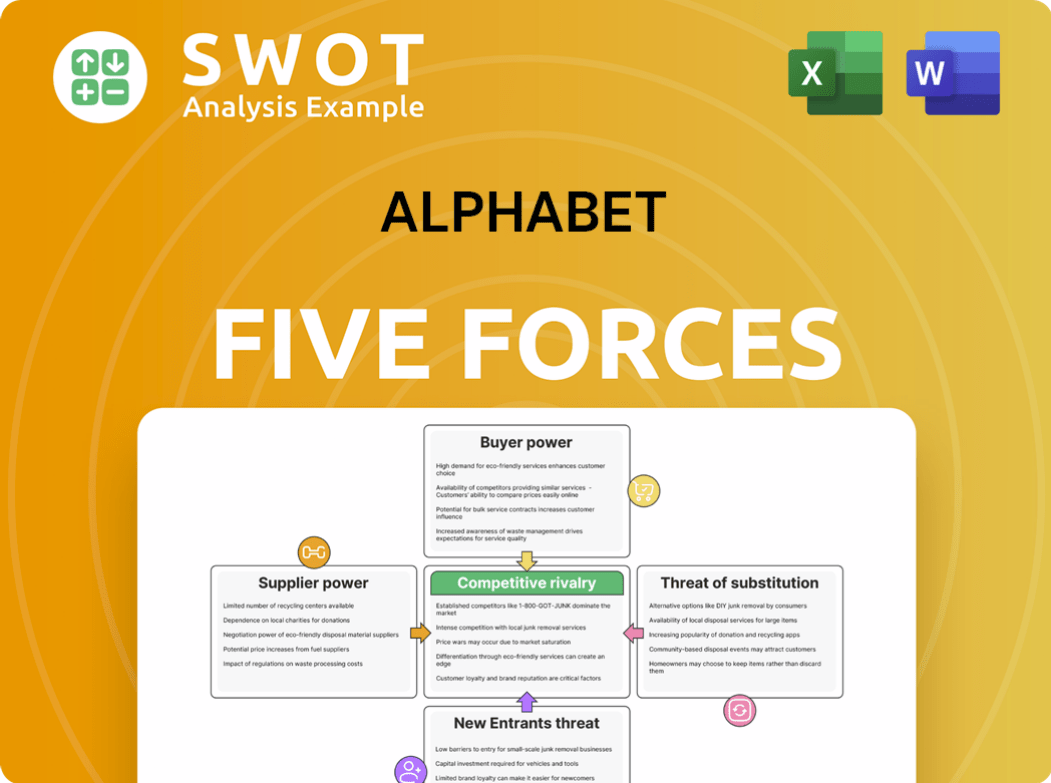
Related Blogs
- What is Competitive Landscape of Alphabet Company?
- What is Growth Strategy and Future Prospects of Alphabet Company?
- How Does Alphabet Company Work?
- What is Sales and Marketing Strategy of Alphabet Company?
- What is Brief History of Alphabet Company?
- Who Owns Alphabet Company?
- What is Customer Demographics and Target Market of Alphabet Company?
Disclaimer
All information, articles, and product details provided on this website are for general informational and educational purposes only. We do not claim any ownership over, nor do we intend to infringe upon, any trademarks, copyrights, logos, brand names, or other intellectual property mentioned or depicted on this site. Such intellectual property remains the property of its respective owners, and any references here are made solely for identification or informational purposes, without implying any affiliation, endorsement, or partnership.
We make no representations or warranties, express or implied, regarding the accuracy, completeness, or suitability of any content or products presented. Nothing on this website should be construed as legal, tax, investment, financial, medical, or other professional advice. In addition, no part of this site—including articles or product references—constitutes a solicitation, recommendation, endorsement, advertisement, or offer to buy or sell any securities, franchises, or other financial instruments, particularly in jurisdictions where such activity would be unlawful.
All content is of a general nature and may not address the specific circumstances of any individual or entity. It is not a substitute for professional advice or services. Any actions you take based on the information provided here are strictly at your own risk. You accept full responsibility for any decisions or outcomes arising from your use of this website and agree to release us from any liability in connection with your use of, or reliance upon, the content or products found herein.